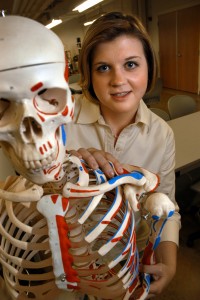Biologists share a passion for understanding the living world. At N.C State students can elect to pursue a Bachelor of Science (BS) in Biological Sciences or a Bachelor of Arts (BA) in Biology.
The Bachelor in Science (BS degree) encompasses a wide range of areas, and we offer five different ways to meet the requirements for a B.S. in Biological Sciences. Students studying for a degree in Biological Sciences can opt for a general curriculum (BLS) or can choose to focus in a particular area by selecting one of four areas of concentration: Molecular, Cellular, and Developmental Biology (MCD), Integrative Physiology and Neurobiology (IPN), Human Biology (HB), or Ecology, Evolution, and Conservation Biology (EEC). All of our curricula are designed to provide a solid foundation in biology as well as the related fields of chemistry, physics, and mathematics. Upper-division course requirements vary among the different curriculum options (see below), but each provides some flexibility to select courses that best fit your interests and career goals. Requirements for a degree in Biological Science are demanding, but they are designed to prepare students for exciting roles in a rapidly changing and increasingly complex world.
The Bachelor of Arts (BA degree) in Biology is the newest degree offering from the Department of Biological Sciences. This degree was created to meet the needs of students who desire a solid foundation in the life sciences but also want to pursue extensive studies in a second, complementary discipline outside of the life sciences. Students interested in an interdisciplinary or multidisciplinary approach to their undergraduate education may find that this degree option better serves their interest and career goals than the B.S. degree. Students work in consultation with their academic advisor to design a secondary area of focus by identifying at least 21 credit hours of cross-discipline electives, which must then be approved by the Director of the BA Program. Topics created by students to date include: healthcare throughout the life cycle, developmental psychology, global public health, civil rights & social justice, math, human behavior, cross-cultural communication, political science, social work, psychology, health policy, and anthropology.
Watch this video to learn more about the BA in Biology.
Questions about these programs? Contact: BioSciHelp@ncsu.edu
Courses include:
All Biological Sciences students take core courses in introductory biology, chemistry, physics, and calculus. The B.S. degree differs in having more advanced course requirements and electives. For example, the Molecular, Cellular & Developmental concentration requires cell biology and recombinant DNA courses; the Integrative Physiology & Neurobiology concentration requires endocrinology and neurobiology courses; Human Biology has advanced human anatomy and physiology courses as well as microbiology; Ecology, Evolution & Conservation has courses in field ecology, evolution, and conservation biology; and the degree requirements for Biological Sciences with no concentration requires students to choose one course in each of four areas (animals, plants, organismal function, and ecology and evolution).
| College | |
| Discipline |
|
| Academic Department |
|
| Departmental Contact | |
| Major Overview | |
| Plan Requirements | |
| Semester Sequence | |
| Related Majors |
|
| Minors | |
| Related Minors | |
| Skills You Could Develop |
|
| Learn More About This Major | |
| Career Titles |
|
| Learn More About Careers |
